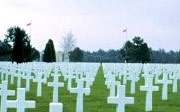Let's also remember the great cost of an even greater freedom. This occurred during a war fought for the whole human race in which freedom from sin and death were purchased. This freedom was purchased at great cost as well. The symbol of this cost is not a hillside with rows of white crosses, the Tomb of the Unknowns, or a reflective black wall of names. As precious as these symbols are, they do not compare to the symbols of the Cross and the Empty Tomb. These symbols transcend ethnic, geographical, and national boundaries.
The Cross and Empty Tomb are our symbols of the cost of true freedom for all people - the cost of Jesus leaving the security and safety of heaven and becoming earthbound and mortal. It is the symbol of the degradation of a crucifixion, the humiliation of mockers, the agonizing death on a cross, and three days in the tomb. However, the words to this tune are different. "Find the cost of freedom, no longer in the ground."
You see, the Empty Tomb is the sign of ultimate freedom. It is the reminder that we no longer have to fear death. All of our mortal fears are conquered. As the apostle Paul says, "'Death is swallowed up in victory. O death, where is your victory? O death, where is your sting?' ... How we thank God, who gives us victory over sin and death through Jesus Christ our Lord!" (1 Corinthians 15:54-57 NLT)
For the Christian, Independence Day doesn't come once a year, but every week. The early Christians met on the first day of the week, Sunday, to take of the Lord's Supper. (Acts 20:7) This was their Independence Day celebration. By the end of the first century, Sunday had become the Lord's Day. (Revelation 1:10) On this day, they remembered the Lord's death and anticipated his return because their freedom from sin and death had been won. The ultimate Independence Day for Christians is the day of the Empty Tomb! So as each Sunday approaches, let's remember the cost of our freedom and give thanks!
"Because God's children are human beings - made of flesh and blood - Jesus also became flesh and blood by being born in human form. For only as a human being could he die, and only by dying could he break the power of the Devil, who had the power of death. Only in this way could he deliver those who have lived all their lives as slaves to the fear of dying." (Hebrews 2:14-15)












Comments
Have thoughts on this article? Leave a comment